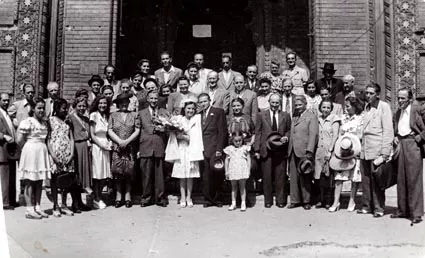At my older sister Klari's wedding on June 5, 1945. The picture was taken in front of the Dohany Street synagogue. In the first row, fifth from the right, is my uncle Imre Kauders, the sixth is the father of the groom, the seventh is the mother of the groom and in front of her is the groom's niece. In the first row, first from the left is me, the second is my mother and the third is my father.
Klari married Sandor B. in 1947, whom she'd met at a student ball during the war. Sandor was born into a religious Neolog Jewish middle class family in 1922. His father was an agent, his mother a housewife. Sandor had a sister one year older than him, who survived the war with her husband and little daughter who was born in 1943. The girl became an accountant, married a number of times, and has no children. It made no difference that Sandor graduated as an 'A' student, he couldn't go to university [anti-Jewish laws forbade it]. He learned a trade, worked in a factory, then became a work serviceman [forced labor]. Then in 1945, they accepted him at university, and he became an engineer. Klari graduated later in the Hungarian English department of the College of Humanities, and taught until she retired. Sandor died in 1980. They had a son who emigrated to Australia. Klari left to live with them in 1992 and lives there ever since.
Imre, the printer was my favorite uncle. He worked in the University Printing House, and that was such a prestigious thing in my childhood. Even before the war, he was a well-known person in the trade union movement, but after the war he remained a printer, didn't become an independent functionary, but to the end he was a dedicated left-wing person. His wife, Mariska was a peasant girl from Bugac, who wasn't Jewish, and with whom he lived in a very happy marriage. In 1944, his wife saved him like a lion. Uncle Imre was taken somewhere, not to the work service [forced labor] because he was already too old for that, but I don't know where, and Mariska went after him, got him out of there, and they went into hiding together. [There's no data on when this happened but mixed marriage was regulated from the beginning of 1945 like so: In the beginning of 1945, the Arrow Cross parliament authorized Christians married to Jews to divorce their spouse with no type of responsibilities. The law stipulated that Christians in mixed marriages with Jews who are not willing to divorce, fall under the jurisdiction of the anti-Jewish measures. There was no practical significance of this, because the Arrow Cross directors (including Ferenc Szalasi and his government) had already fled Budapest by this time, and their regulations had no real effect on the Jews of the capitol city.] Among all my father's siblings, they were the ones who had a very close, very intimate relationship until both of their deaths. They lived in Rakosszentmihaly, and it was the relation that gave my dogged love a home in the summers of my childhood. They didn't have children. They died in 1970. They're buried in the urn cemetery, it was a funeral of the [worker's] movement. It was quite horrible. It was the first communist funeral that I attended. He and his wife had looked out for my family until their deaths.



















